Support Center.
Get Started or Become a Pro. Browse our support articles to learn how to get the best out of PeopleGoal.
How to Run a Performance Review with Multiple Managers
The employee/manager discussion is the core of a performance review, but the process rarely ends there. From a project lead to an indirect supervisor or department head, there are many people who need to weigh in on an employee appraisal. Not to mention the important admin participation from HR, finance and leadership. All this can add up to a complex, multi-faceted performance review.
PeopleGoal translates this tricky process to a seamless workflow in our Performance Reviews with Multiple Managers app. The app template is ready to go if you're looking for an out of the box solution, or you can easily customize your review using our simple, no-code workflow builder.
Following the steps below, install and launch a performance review with multiple managers in a matter of minutes:
1. Install your Performance Reviews app template
2. Customize the app template (optional)
3. Configure the app states (optional)
4. Manage your app participants
Let's get started.
1. Install your Reviews with Multiple Managers App Template
Open up any workspace, click Create a new app, then select Store template.
Select the Reviews - Multiple Managers app and click Add this to your account.
Select the workspace (and workspace folder) you want this app to belong to from the drop-down menu, then click Install template.
We'll take a few seconds to add this to your account.
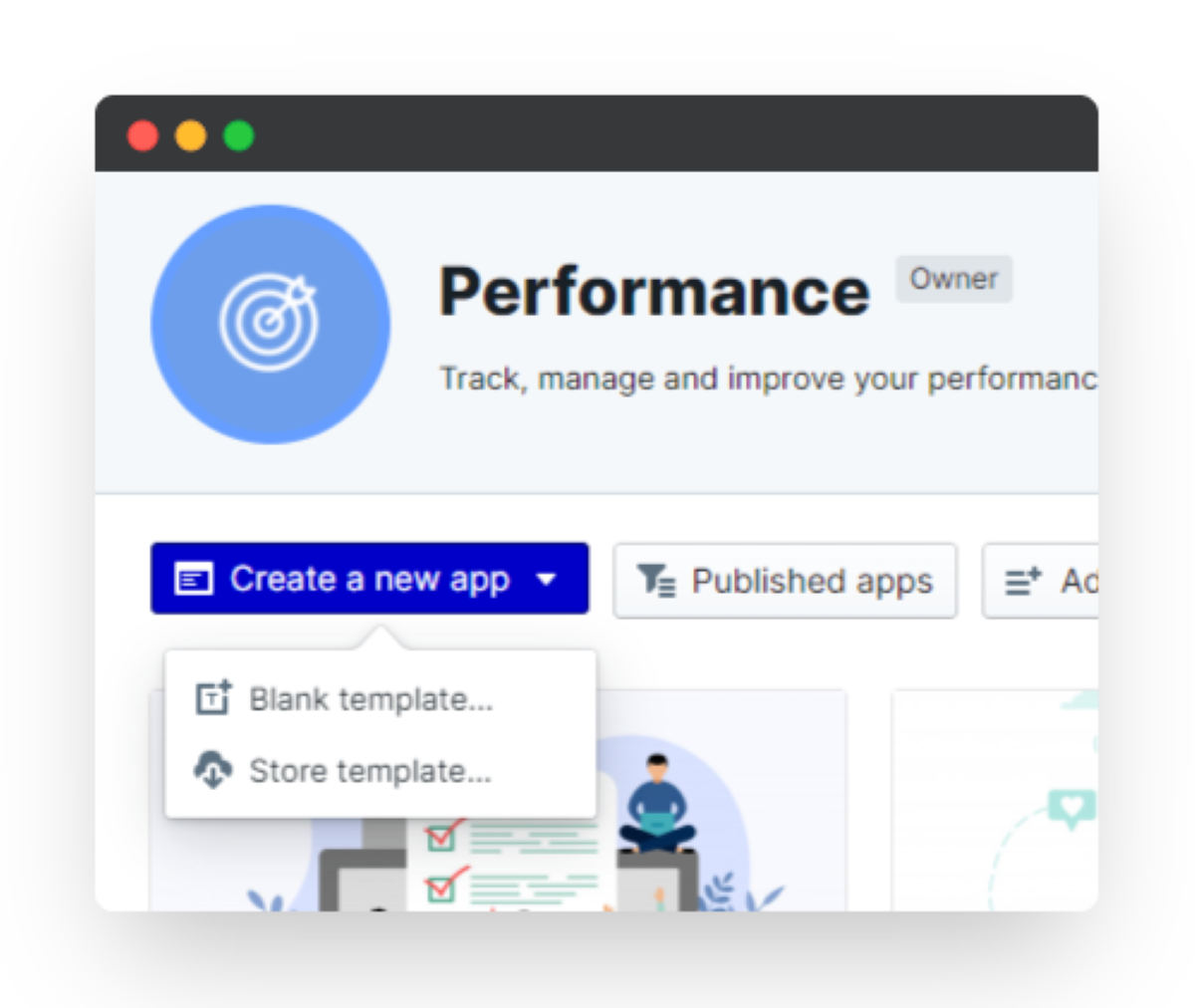
You'll be taken straight to the app to get started.
All of the pre-built review questions and states are installed and ready to go. You can use the app right out of the box! To skip the customization, jump down to step 4 and set up your app participants and permissions.
2. Customize the Performance Reviews App Template
If you do want to configure the review to add your own questions and states, click Template from the menu of options at the top the screen.
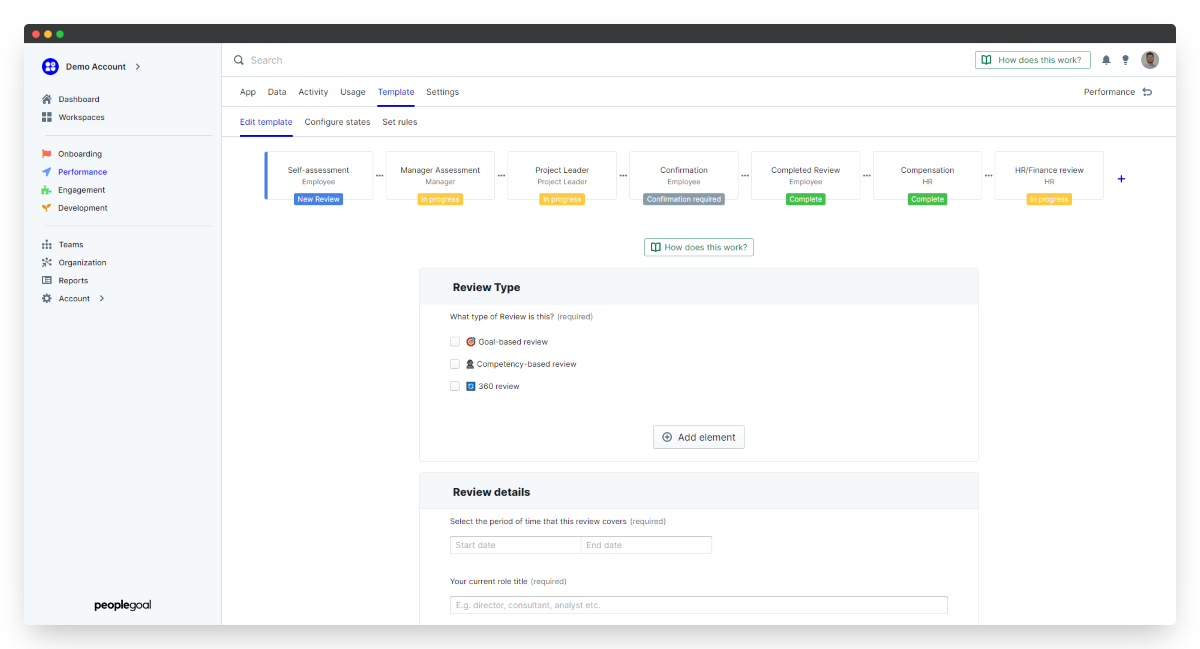
i. Edit existing elements
Elements are your individual form fields that make up your review. Whether they're text questions, rating selects, display-only fields or numerical calculations, every element can be changed to suit your custom process and company culture.
To change a field, hover over the right-hand side of the element and click the three dots that appear.
Select Edit element (your element will have a name like "Select", "Description", "Rich-text area", etc.). The element editor will open up.
Change any fields you need to and click Save changes to update.
In this example we'll change up the "Your current role field" to have a different title and display text. We'll also mark it "not required" so that it's an optional response only.

Note that each element is unique, so if for example you change the rating set on one element you'll need to change any other questions to match this. Don't worry, it's quick and easy to duplicate an element once you're happy with its setup.
ii. Duplicate elements
Hover over the right-hand side of the element and click the three dots that appear.
Select Duplicate element and an exact copy will be created below.
Edit the duplicated element to change your question text.
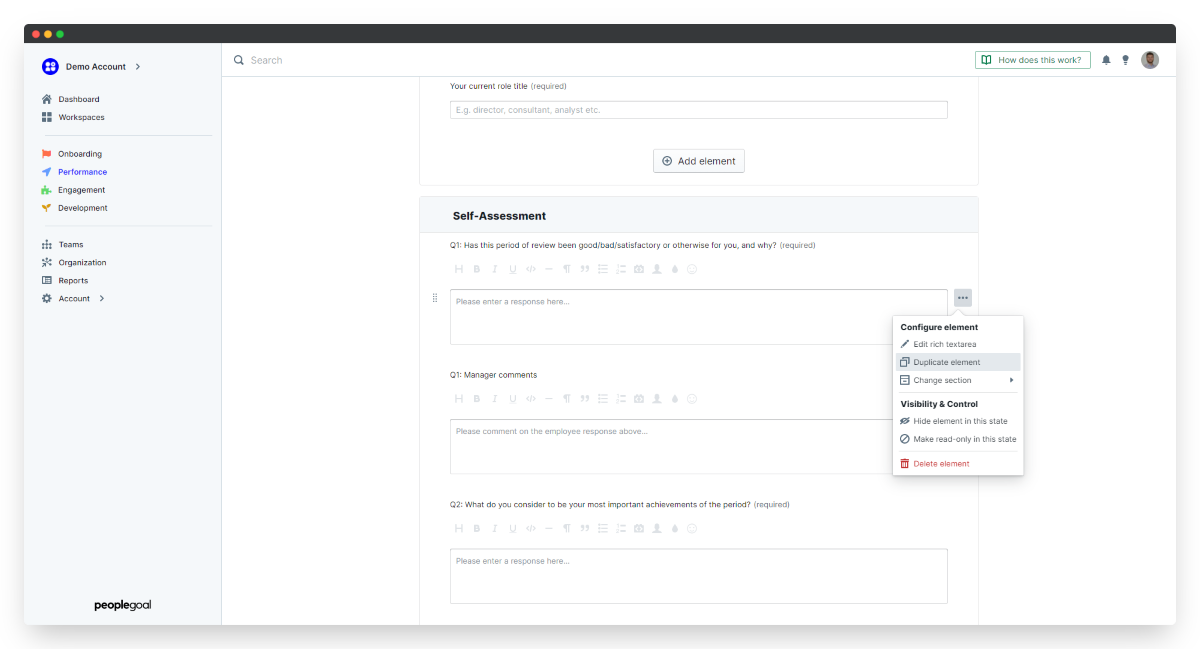
iii. Reorder elements and sections
Reordering is super easy - you just click and drag to change the element or section order.
Hover over the left-hand side of the element (or section title) and click and drag your element or section to its new location.
To move an element to a different section, hover over the right-hand side and click the three dots that appear.
Select Change section and choose the new section you want the element to belong to.
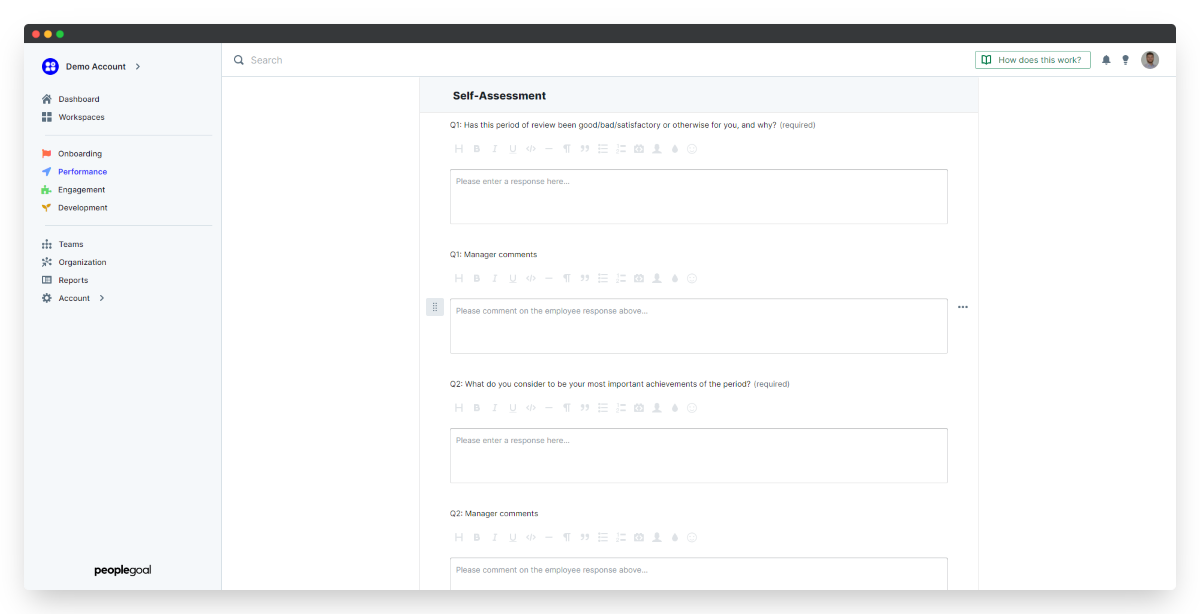
iv. Create new elements and sections
At the bottom of each section, click Add element and select the element type you want to insert.
A new element that's useful to add to your first section is a display-only Description or Rich-text area. You can use this to remind employees and managers of the key review cycle dates, or give instructions on how to complete their performance reviews.
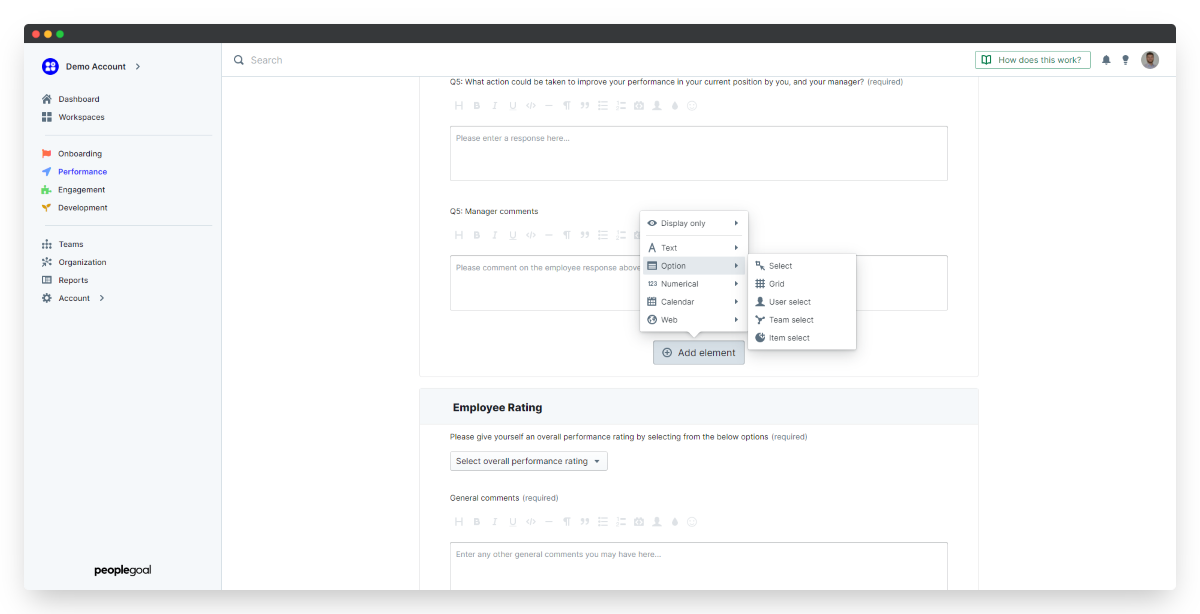
To add a new section, scroll to the very bottom of your template form and click Add section. Then click and drag your new section to where you want it to sit in the review flow.
In our example we're going to add a section for an HR/Finance review to discuss compensation and bonus recommendations.
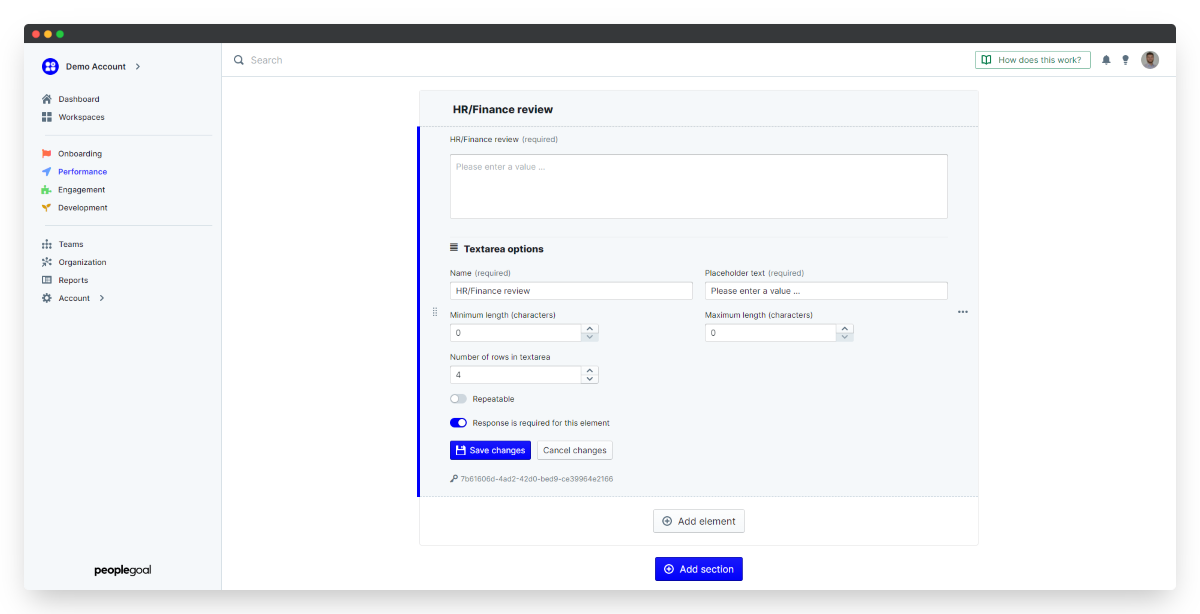
3. Configure the Reviews with Multiple Managers App States
States are the steps in your Reviews workflow, and each state has its own participant. The employee self assessment is one state and the employee is the participant - likewise with the manager assessment and supervisor assessment states.
There's no limit to the number of states you can add to your Reviews workflow, allowing you easily create a complex process where every stakeholder can participate. You can also control the visibility of sections (and individual elements!) in every state, and select whether they are read-only, editable or hidden to the selected state participant.
i. Add a new state
Click the + button in your workflow builder to create a new state.
Enter your state name, define the participant, and choose a status flag.
Toggle on/off whether sections are visible or editable by default (don't worry - you can override this later if you need to).
Click and drag your state to reorder your Reviews workflow and you're done!
In our example above we added a section for an HR/Finance Review. We're going to create a state for this section so that we can define the HR/Finance participant and allow them to give their input on the employee performance review. This is a confidential section, so we're also going to hide it in all other states. Lastly, we want the HR/Finance reviewer to be able to read the employee and manager responses so we'll make sure to mark all other sections as read-only, and make the HR/Finance review editable in the appropriate state.
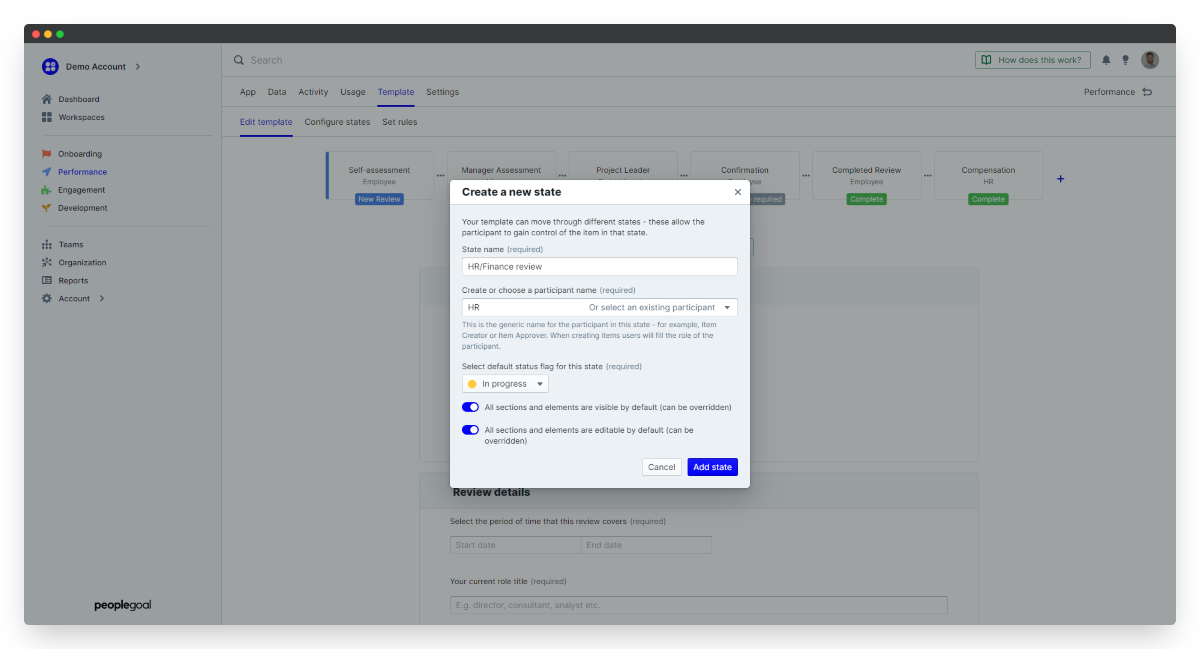
ii. Delete a state
To take out a state you won't be using, click the Template tab and select Configure states.
Select the state you want to delete and you'll see the blue highlight bar appear to confirm which state you've selected.
Click Delete state to remove it completely.
In our example our team only wants to have one manager assessment so we'll delete the Project Leader Assessment state. We'll also delete the Project Leader section in the app template so that those questions aren't included in the workflow.
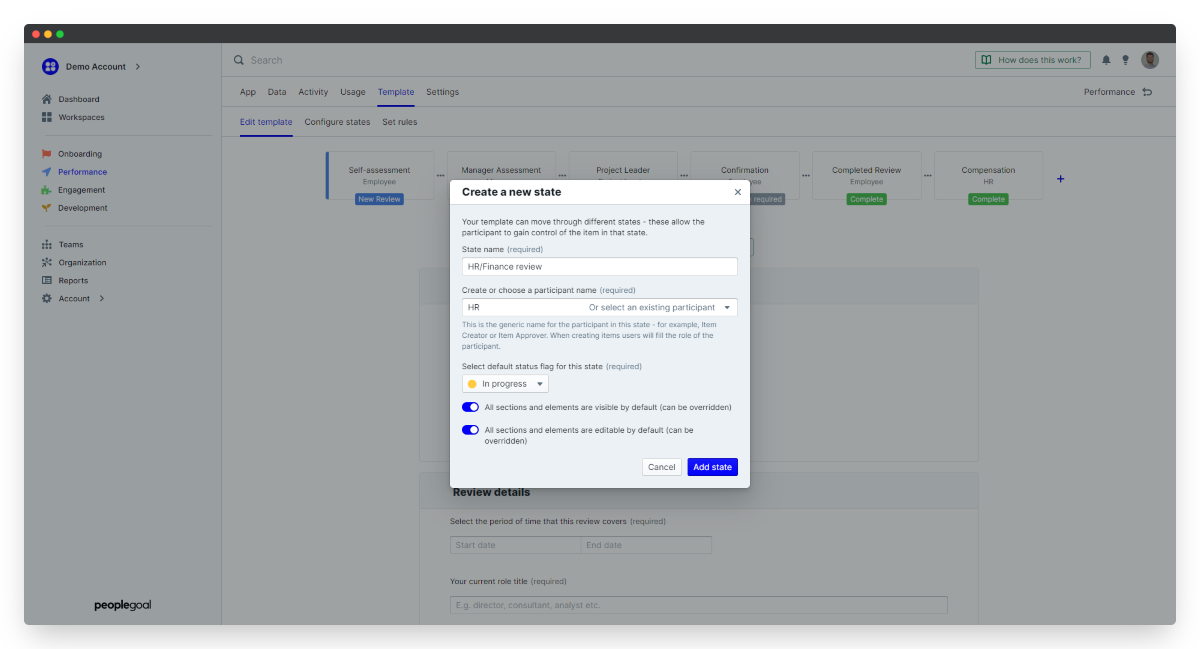
iii. Customize your status flags
Every state has a default status flag that indicates to all participants what stage of the process their item is in. Your Reviews with Multiple Managers app is set up with default status flags which you can customize.
In the Configure states menu, click on Manage status flags.
Click a flag title to rename it, and click the color picker to choose a new flag color.
Click Create a new status flag to add an additional flag.
Select the state to which you want to assign your flag, choose which flag to give it and click Save changes to update.
It's a good idea to delete any unused status flags so that they don't clutter up your Item filter once your Reviews are underway.
We're going to change up the status flags for the Supervisor assessment and HR/Finance Review so that it's clear to the employee at what stage their review is once they've sent off their self assessment. We'll also delete the "Rejected" status flag because it won't be used in this app.
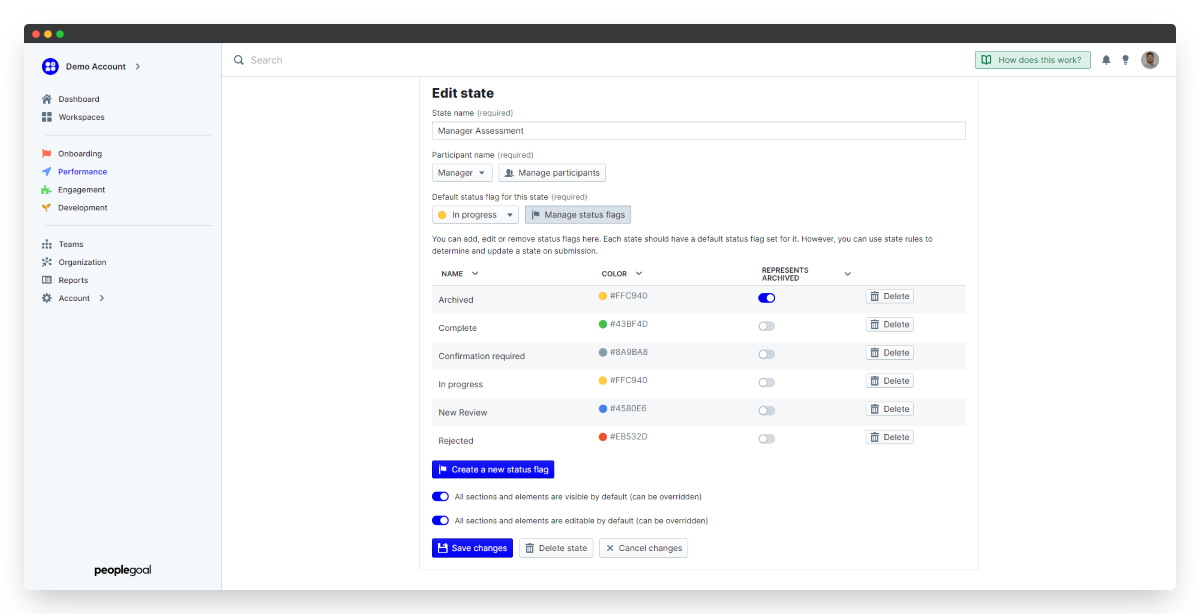
4. Manage your Performance Reviews App Participants
Participants are the individuals involved in the review and each state has one participant. To automate your performance reviews you can create default participants based on your account Relationships, define an individual as the state participant, or leave these blank to allow the employee to select all participants in their review.
Setting up your participants based on relationships means that when an employee's review is opened, all of the people who need to be involved in the workflow are automatically assigned.
i. Set default relationships and users
Open up the Configure states menu and select Manage participants.
For each participant set a default user or default relationship to automate the reviews workflow.
You can also rename the participants to suit your company language.
Here we're going to set our default relationships for the Manager and Supervisor roles, and we're going to set Jenny Jones, our HR Director, as the default user for the HR/Finance review.
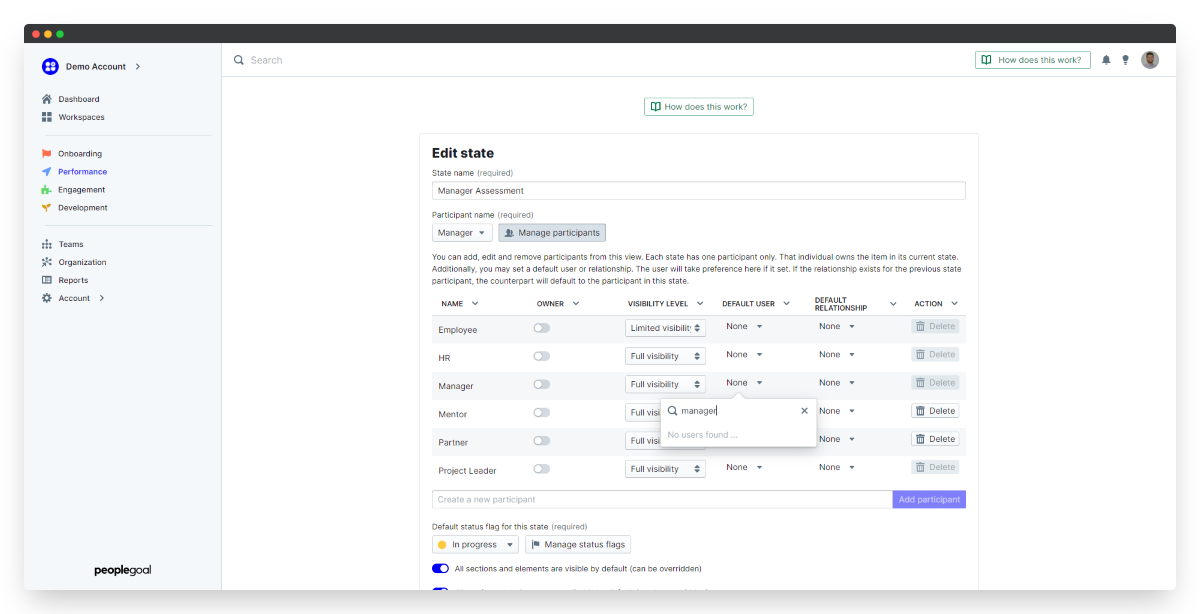
ii. Define the participant's visbility
As you can see there are a lot of moving parts in this review! With lots of different participants you need to control who can see the data at every step. Visibility defines whether a participant can see the review only in the state that they own (limited visibility), or in all states (full visibility).
By default participants can only see the review when it's in a state that they own. The employee should have limited visibility because we don't want them to see their managers' assessments before they are officially released. The employee will see their review when they draft their self assessment, and again when it comes back to them for the final confirmation - both of these are states where the employee is the participant.
The line manager, however, should have full visibility over the whole process - even when they're not directly participating.
To change a visibility level, click the drop-down next to the participant name and choose Limited or Full visibility.
Click Save changes to lock in your updates.
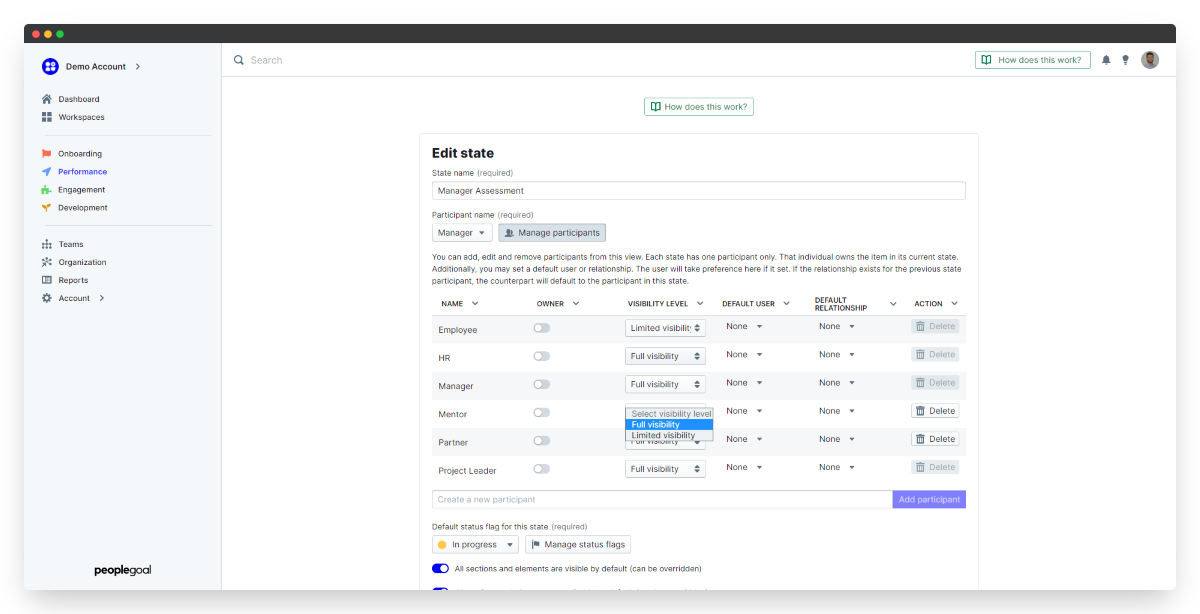
5. Set the Reviews App Permissions
Nearly ready to launch! The last step in automating the reviews workflow is to decide who can create, edit and/or view all the Reviews in your account. To do this, we use Permissions.
Permissions control the access to your app within your PeopleGoal account.
To set your permissions, click on the Settings menu, then expand the Permissions section. Click on Explain permission types to understand the access that each permission gives your account users.
i. App-wide permissions
For performance reviews we'd recommend you set the permission to Create only. This means employees can create reviews for themselves but can't see any colleagues' reviews.

ii. Specific team and user permissions
The user who installed the Reviews app template has Owner permission by default, and can assign specific permissions to other teams or users. Specific team and user permissions supercede the default permission type.
To assign a specific permission, select Configure specific permissions, then under "User permissions" click Add user.
Type your colleague's name to add them to the permissions list. In the "Permission type" column, select which permission level to give them.
You might want to give "View only" permission to your C-Suite, so that they can see all performance reviews for all employees but not change the app settings or edit reviews they're not a participant in.
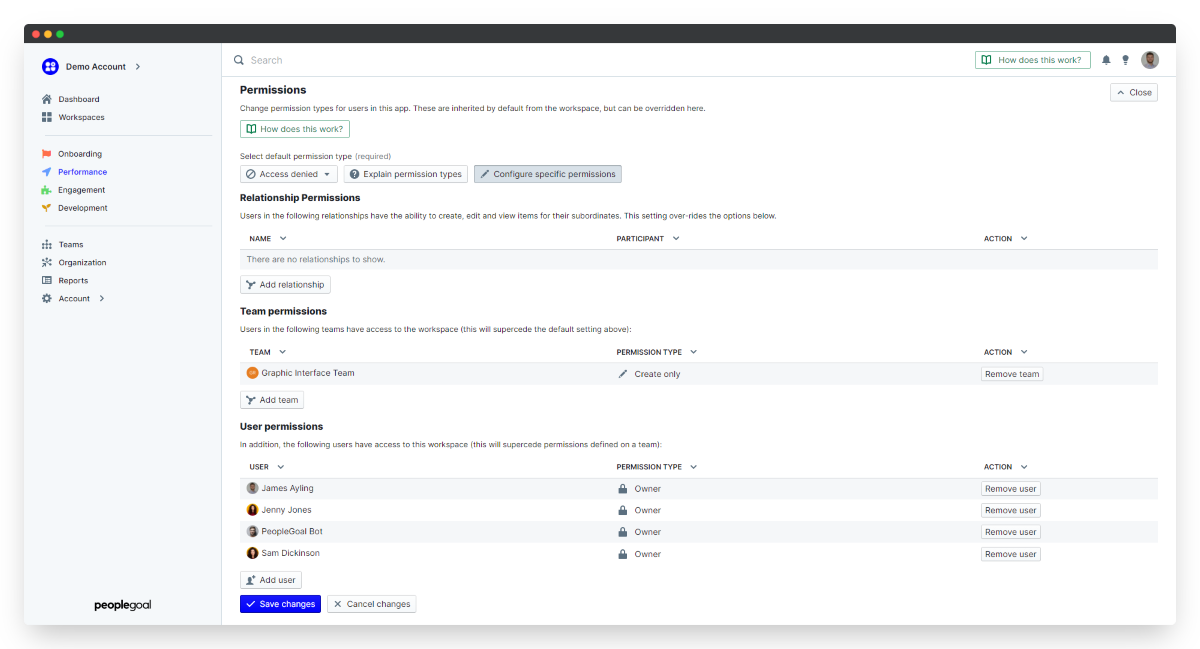
6. Launch your Performance Reviews!
You're ready to roll! All you need to do now is kick off reviews for your employees. You can either create these for individuals or have users create reviews for themselves.
In both cases, click on the Reviews menu and click New Review.
To start a review for yourself select your own name.
To start reviews for individuals, click Select user(s) and search for individual employee names.
Or, click Select team(s) of users and you can kick off reviews for entire user groups! Tip: select your Company team here to start a review for everyone in the account.
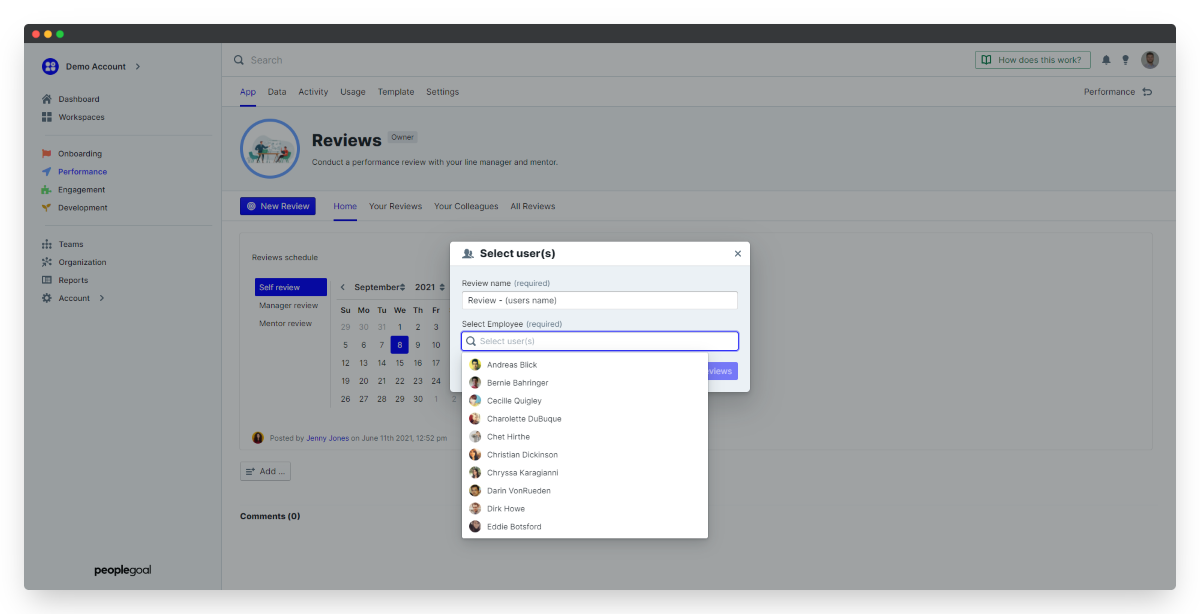
Next steps: set up your custom performance review analytics and reports
We know that every company has its unique ways of working, and the metrics you want to analyze in a performance review are different to any other organization. We capture every single data point from your performance reviews app in the Data table, to help you to build custom reports and automated charts. Head over to our Reports building article to learn how to create custom reports and analytics tracking.
Once you've got your performance reviews with multiple managers up and running, take a look at other apps you can install within your Performance workspace. We'd recommend implementing regular check-ins to grow your employee/manager relationships, and 360 feedback to gather insights from peers, colleagues and supervisors. You'll find all these and more in our App Store.
Don't have a PeopleGoal account yet? Book a demo to see our no-code HR workflow builder in action!
PeopleGoal Support Team
Account Management & Implementation Specialists